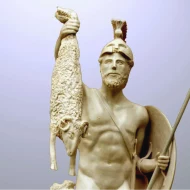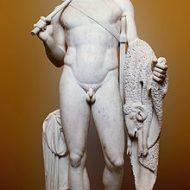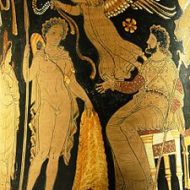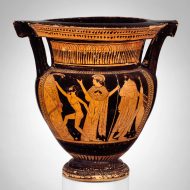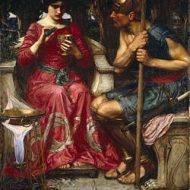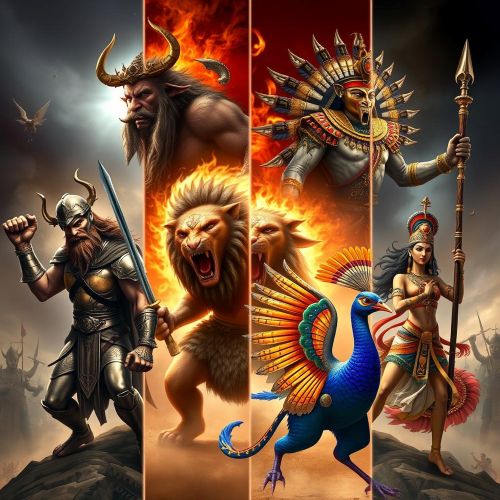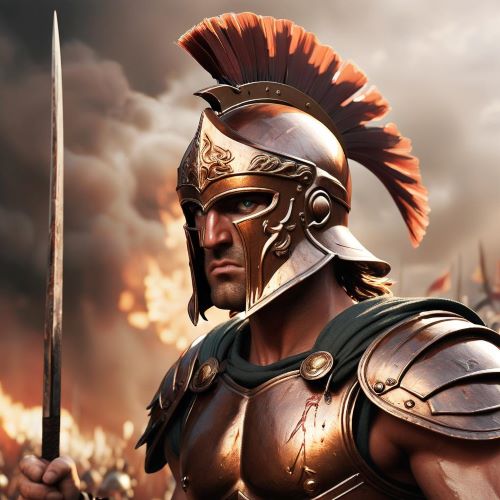Jason : The Greek Warrior
Listen
At a glance
| Description | |
|---|---|
| Origin | Greek Mythology |
| Classification | Mortals |
| Family Members | Aeson (Father), Alcimede (Mother), Pelias (Brother) |
| Region | Greece |
| Associated With | Golden Fleece |
Jason
Introduction
Jason was the leader of a group that traveled to find the Golden Fleece in Greek mythology. Although he was able to complete the mission, he failed to become the ruler of Iolcus. His fate was sealed when he developed a relationship with Medea, an enchantress.
In Greek mythology, Jason was the leader of the Argonauts. He was the son of Aeson, the king of Iolcos. When his father’s half-brother, Pelias, seized Iolcos, he was taken away to the Centaur Chiron. Upon his return, he was promised to give his inheritance to his sibling, if he could acquire the Golden Fleece.
After several failed attempts to find the Fleece, Jason teamed up with Medea to get rid of it. When they returned, Medea killed Pelias, forcing them to take refuge with Creon of Corinth’s son. Later, he deserted Medea and sought the protection of Creon’s daughter. This incident, which led to the birth of Euripides’ Medea, formed the basis of the Greek philosopher’s mythology.
Physical Traits
Jason is regarded as one of the most significant heroes of Greek mythology. Throughout antiquity, different depictions of him have been made. In the earliest source materials, he was depicted as a strong and handsome hero. He was an awesome man with two spears. He wore various clothing pieces, including a native Magnesian dress and a leopard-skin coat. His magnificent locks of hair were not cut away, but they flowed down his back. According to Pindar, he looked like a godlike figure. He compared him to Apollo and Ares.
Family
Like many heroes of Greek mythology, Jason had royal blood. His father was Aeson, who was the king of Iolcus. His half-brother, Pelias, wanted the throne, and he overthrew him. He was sent away to be protected by Chiron, a wise centaur. He was a creature that was half horse and half man. He taught the boy various skills, such as medicine and warfare. Some believe that Chiron’s actions inspired the boy’s name, which literally means “healer.”
When he was twenty, Jason went back to Iolcus with the goal of regaining the throne he rightfully owned. He came across an old woman who was walking across a flooded stream. He was unaware that she was a goddess known as Hera, who was scheming to ruin Pelias and take his throne.
Pelias was warned by an oracle or other individual who could speak with the gods about a man wearing a sandal. When he arrived at Iolcus, he was confronted by the king. After identifying himself, Jason declared that he was on his way to the throne. To prevent him from attacking him without being exposed, the king resorted to trickery. According to him, if Jason could bring the Golden Fleece to him, he would become his heir. Pelias, on the other hand, thought it was incredibly difficult to get the prized item from the Colchis land.
Other names
Among the heroic epithets that Jason is known for is “warlike.” But, some of his more unusual epithets, such as “hapless,” are a surprise and reflect the antihero stereotype that he was often depicted as during antiquity. It is believed that his name was originally that of a Greek god known as Diomedes.
Powers and Abilities
Sources tried to depict Jason in a negative light. For instance, in Euripides’ perspective, he was an opportunistic thief who would do anything to get what he wanted. Apollonius of Rhodes was a poet who lived during the third century BCE. He provided us with the most accurate depiction of Jason. He was regarded as an antihero, and he was mainly known for his intelligence and charm.
Modern Day Influence
Although he is best known for his role in the 1963 film, Jason has also appeared in other television and film adaptations of Greek mythology. One of these is the 1990s television series, Hercules: The Legend of the Journeys. Over the years, various video games have featured Jason as both the protagonist and the antagonist. Some of these include Age of Mythology, God of War II, and Fate/GrandOrder.
Related Images
Frequently Asked Questions
What is lorem Ipsum?
I am text block. Click edit button to change this text. Lorem ipsum dolor sit amet, consectetur adipiscing elit. Ut elit tellus, luctus nec ullamcorper mattis, pulvinar dapibus leo.
What is lorem Ipsum?
I am text block. Click edit button to change this text. Lorem ipsum dolor sit amet, consectetur adipiscing elit. Ut elit tellus, luctus nec ullamcorper mattis, pulvinar dapibus leo.
What is lorem Ipsum?
I am text block. Click edit button to change this text. Lorem ipsum dolor sit amet, consectetur adipiscing elit. Ut elit tellus, luctus nec ullamcorper mattis, pulvinar dapibus leo.
What is lorem Ipsum?
I am text block. Click edit button to change this text. Lorem ipsum dolor sit amet, consectetur adipiscing elit. Ut elit tellus, luctus nec ullamcorper mattis, pulvinar dapibus leo.
What is lorem Ipsum?
I am text block. Click edit button to change this text. Lorem ipsum dolor sit amet, consectetur adipiscing elit. Ut elit tellus, luctus nec ullamcorper mattis, pulvinar dapibus leo.

